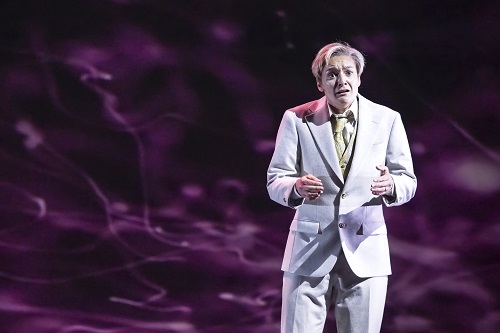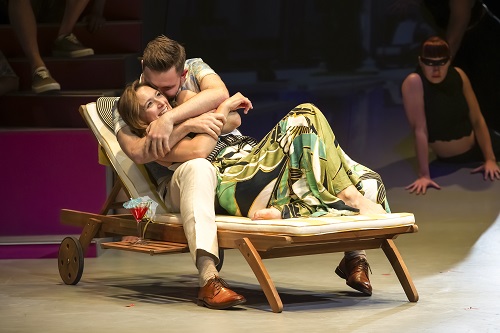Reviewing Daniel Slater’s production of Handel’s Tamerlano at The Grange Festival last year, I remarked that there was ‘so little directorial intervention that what few such gestures there are stick in the mind’. The opposite might be said of this double bill of Gluck and Purcell, which is ‘busy’, kinetic and often witty, and bursting with directorial interpositions, though Slater’s wry irreverence is more successful in presenting Orfeo’s hapless but ultimately ‘happy’ sojourn in Hades than it is in delineating Dido’s tragic love and suffering.
Robert Innes Hopkins’ set is a back wall which curves graciously as it meets the stage – a giant video screen-cum-climbing frame, with a dark opening and three upper niches through which the soloists, chorus and team of five dancer-acrobats climb, dangle, crawl and – in the Gluck – slide audaciously to the ground. In the opening wedding scene of Orfeo ed Euridice, Nina Dunn’s video designs of pastoral foliage almost seem to transport us back outside the theatre, into the warm summer sunshine, as the chorus – The Sixteen, supplemented by members of the Grange Festival Chorus – rush in, jubilantly, attired in summery tea-dresses and pale linen suits, and celebrate the wedding of the white-clad Orfeo (Heather Lowe) and Euridice (Alexandra Oomens) to the punchy accompaniment of Gluck’s overture as played by the Orchestra of the Sixteen, conducted by Harry Christophers.

It’s a dynamic opening. Tim Claydon’s choreography is stylised and buoyant, and The Sixteen relish the opportunity to embody the energy of Gluck’s score physically as well as vocally. Indeed, they are terrific throughout both operas: though they more usually perform in more sober contexts, they act here with naturalness and freedom – perhaps because they know each other so well. They are alert to all of Christophers’ nuances and shades, and they sing with engaging feeling and warmth. Moreover, there must be an enormous amount of energy backstage, too, for they have many costume changes – swapping, with lightning speed, the black garb of the guardians of the Underworld for the silken slip-dresses of the Elysian dwellers, or the smart modernism of Dido’s ‘court’ for the hoodies and trainers of the Sorceress’s groupies.
The infectious, upbeat optimism of Orfeo and Euridice’s nuptial bliss doesn’t last long. In a flash, the colour drains from the scene, as the snake venom does its work and Euridice is ritually wrapped in a white shroud and carried into the Underworld. But, before we know it, lighting designer has bathed the stage in bubble-gum pink and Love swings in, literally, to give Orfeo his opportunity to rescue his bride and return her to the world of the living. Caroline Blair is a sassy Amore, accompanied by five cartwheeling sidekicks in backwards baseball caps (dancers Hayley Chilvers, Electra, Fiona Macbride, Blair Moore and Holly Saw). Slater encourages her, though, to sing her ‘instructions’ to Orfeo direct to the audience – a habit that I noted in Tamerlano too, and which quasi-breaks the fourth wall.

Thereafter, there is much visual and theatrical invention – sometimes representational, elsewhere abstract. An explosive thunderclap – timpani player Robert Howes must have enjoyed himself! – finds Orfeo emerging from the destruction and smoke among the suffering spirits in the ruins of Hades, who clamber and spider up the wall to obstruct his entry. When his pleas finally win their pity, the Elysian Fields come into view – all long-shot pastoral mistiness and gently fluttering wheat chaffs, the calming aura of the bobbing fronds enhanced by the self-stroking undulations of the dreamy dwellers in paradise. Then, with Euridice trailing behind him, Orfeo struggles to find his way through a red cat’s-cradle maze, spun with geometrical athleticism by the lithe and tricksy dancers.
At this point, things get a bit bemusing. The path disappears, Orfeo gets lost, and it is this that seems to cause his backward glance, not his inability to resist the temptations of love and desire, causing Euridice – who has clambered up the wall to be with her beloved – to fall from his grasp and slip gracefully to her death. Amore duly returns to resurrect Euridice once more, and a ‘re-play’ of the opening scene begins. Will this all be proven to have been just a dream? Well, no. Though there is gleeful romping and rejoicing, Euridice dies all over again – it must be a bit wearying – and when she finally returns at the close, though the revellers have danced themselves merry, Orfeo stands alone, apart, forlorn.

Having cogitated, I’m still not sure what to make of this happy-ending-that-isn’t. But, bewilderment can be pushed aside by admiration for the musical merits of the production. Christophers makes everything terrifically ‘alive’ and vibrant. The string sound is appropriately raw but always elegantly phrased, woodwind and horn solos float gracefully through the textures. All the singers are absolutely committed and dramatically persuasive – even when they are singing while hanging from, or gliding head-first down, the back wall.
It perhaps helps that Heather Lowe is a trained ballet and ballroom dancer! As Orfeo, her rich mezzo generally glows and projects well, although she sometimes struggles to focus the lower regions of the role and I found her fast vibrato a little to emphatic for the ‘simplicity’ of Gluck’s melodic mode. But, this was a gallant and heartfelt performance, and at the ‘big moments’ she was authoritative. Soprano Alexandra Oomens is winningly bright and clear as Euridice, her silvery tone utterly charming and Euridice’s changing emotions – passion, joy, confusion, fear, anger – touchingly expressed.

Oomens and Lowe paired up again in Purcell’s Dido and Aeneas, as Belinda (and the First Woman) and the eponymous ill-fated Queen, respectively. Slater’s Dido is a modern Instagram It-girl. During the overture we’re whizzed through, along with her hash-tag followers, a sort of digital Paris Match parade of her financial, fashion and romantic ‘news’, including an account of playboy prince Aeneas’s strife and exile. She flounces into her swish apartment and petulantly tosses the cushions on her outsize cerise sofa to the floor, before crashing out in self-pitying misery. It’s left to the level-headed PA, Belinda, to restore order and calm; and to have the suitcases packed and ready, and the flights booked, when the besotted duo decide to jet-set off for a luxury break in the sun.
Slater’s production is pacy and sharp – it dances delightfully. The trouble is that it’s so keen to be droll that when the despair comes its more bathetic than convincing. Heather Lowe tries to persuade, but I’d have liked a less vocally intense reading of Dido’s lament – the intensity rests in the simplicity, surely. Oomens and Blair (the latter as the Second Woman) duet with delicious felicity; as the First and Second Witch, Kirsty Hopkins and Katy Hill enjoy the mischief-making and choreographed ‘routines’ with an animated tomfoolery matched by the gusto of the choric ‘ho, ho, ho’s. Tenor James Newby sings the role of Aeneas with a rather unyielding tone, but this prince is no pushover. As the Sorceress, Helen Charlston – striding the stage in black leather and boots – is terrifically imperious and wicked. George Pooley makes much of the small role of the Sailor.

This is a fittingly fun double bill for a warm summer evening, when the fizz has been flowing and spirits are high. Slater’s invention is often admirable and repeatedly chuckle-raising. Musical standards are unanimously high. Orfeo’s loneliness may perplex, and Dido’s demise might not stir one’s empathy as it can and should, but you will have a jolly good night in the theatre.
Claire Seymour
Gluck: Orfeo ed Euridice
Orfeo – Heather Lowe, Euridice – Alexandra Oomens, Amore – Caroline Blair
Purcell: Dido and Aeneas
Dido – Heather Lowe, Belinda – Alexandra Oomens, Second Lady – Caroline Blair, Aeneas – James Newby, Sorceress/Spirit – Helen Charlston, First Witch – Kirsty Hopkins, Second Witch – Katy Hill, Sailor – George Pooley
Director – Daniel Slater, Conductor – Harry Christophers, Designer – Robert Innes Hopkins, Choreographer/Associate Director – Tim Claydon, Lighting Designer – Johanna Town, Video Designer – Nina Dunn for PixelLex
The Grange Festival, Northington, Hampshire; Friday 9th June 2023.
ABOVE: Caroline Blair (Amore); Heather Lowe (Orfeo) © Craig Fuller